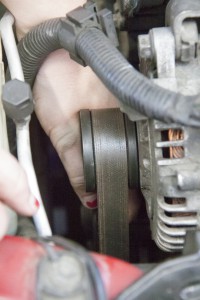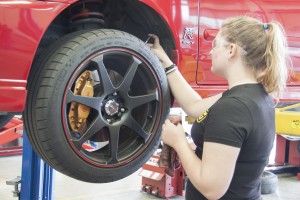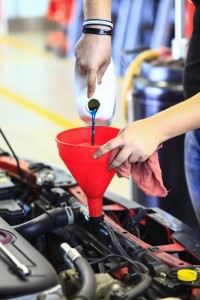Summertime is on the horizon, which means there will be road trips with your family and friends. Your car is picked to be the road trip vehicle, and you know your car can handle the drive.
As you’re driving on the freeway, suddenly the engine starts to emit smoke. You pull over to the side of the road, and you lift the hood of your car to air out the smoke. Do you know what do in this situation? Do your passengers? Before you headed out on this summer road trip, did you inspect your car for any maintenance? Your answer is probably no.
Don’t fret, here’s a breakdown of the main issues you need to look at in order to prepare your vehicle for the summer.
1) Inspect all drive belts and hoses

Inspecting all belts and hoses can prevent any engine damage to your car. Belts give power to the steering pump, the cooling pump, and the air conditioner compressor. Hoses produce a connection for coolant flow between the engine and radiator. Hoses only take 4 to 5 years to deteriorate. Failure to inspect the belts and hoses can lead to your engine overheating.
2) Inspect all tires

Always check the air pressure in your tires. Tires lose about 1 to 2 pounds of air per month. In the summer weather, tires are prone to overinflation which is a reason why you see burnt rubber on the roads in the summertime. You can find many automotive services that offer a cheap way to pump air in your tires. Check out freeairpump.com to search for locations that offer free air for your car. One automotive service called Discount Tires is noted for offering a free service to fill up your tires with air.
Also, do not buy used tires for your car. As much as it is beneficial to save money on tires, used tires will usually have deteriorated due to the worn-out rubber. It’s better to invest in new tires rather than be at risk of an accident with used tires.
3) Inspect the Radiator and the Cooling System

The radiator and the cooling system are very important to the car during summer. Check for leaks and breaks in the system and add coolant or antifreeze. Antifreeze helps to raise the boiling point to 260 degrees, which helps to prevent the overheating of the engine. Changing the fluids routinely will help to prolong the lifespan of many major car components.
The costs for these services will vary depending on the automotive mechanic you go to. Usually, you will have to pay the mechanic hourly, then you will have to pay for the parts you need. The parts of larger vehicles cost more. Once everything is accounted for, a car owner can expect to spend several hundred dollars on their car if they don’t take care of their car routinely.
“Summer is one of those months that can be hard for vehicles,” explained automotive professor Anthony Fedon. “It puts the car at risk and passengers at risk, too. We then have to go into survival mode, and figure out what is wrong with our car.”
Professor Fedon recommends that many people fix their cars in the springtime when they may receive a few extra dollars in tax refunds.
“It is also important to find a highly qualified auto facility and then build a relationship with the mechanic. Building a relationship with a mechanic will save you money and always focus on prioritizing the main issues that are affecting your car,” he said.
Fedon encourages students to take AT 100 because they will learn what kind of questions should be asked when dealing with a mechanic.
“Inspecting your car routinely and also performing maintenance on your car will extend the life span of your vehicle,” Fedon said, adding his 2001 Ford Escape has 456,000 miles on it and the original engine.
Image Sources
- Automotive maintenance_check belts: Stephen Davis/The Telescope | All Rights Reserved
- Automotive maintenance_check tire tread depth: Stephen Davis/The Telescope | All Rights Reserved
- Automotive maintenance_check radiator and coolant level: Stephen Davis/The Telescope | All Rights Reserved

